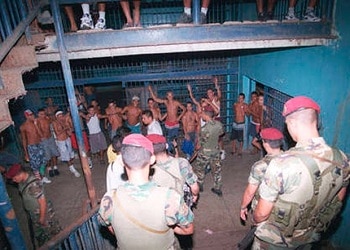A new type of “pranato,” or prison boss, is flourishing inside Venezuelan police stations, where riots, escapes, extortion rackets and killings are now common in holding areas. These makeshift prisons also breed power struggles amid rampant official corruption and neglect.
A violent riot occurred on May 24 within a police station in the municipality of Páez in the state of Portuguesa. The riot left 29 prisoners dead and 14 officers injured, revealing yet again the bloody and criminal reality within these Venezuelan detention centers.
Media reports stated that a clash broke out between the prisoners and police. It began when the inmates made a series of requests that were not accepted by authorities.
According to on-the-ground sources, inmates demanded the dismissal of the prison director, Guillermo López, among other demands, which included materials to build a pool, and the entrance of women, liquor and cigarettes. Such benefits have been accepted by authorities in many prisons and detention centers run by prison bosses.
SEE ALSO: Female Prisoners in Venezuela Become Cell Block Bosses to Survive
After the proposals made by prison boss Wilfredo José Ramos Ferrer were rejected, the inmates took family members visiting other prisoners hostage. The situation saw the national police’s Special Action Forces (Fuerzas de Acciones Especiales – FAES), which has been accused of participating extrajudicial killings, being called in to stop the riot.
The more than two dozen deaths in the riot were labeled as a massacre by prisoners’ rights groups, such as Una Ventana a la Libertad (A Window to Liberty).
But Portuguesa’s Citizen’s Security Secretary, Óscar Valero, stated that the response by authorities was necessary to stop an “escape attempt” and a “dispute between gangs.”
A week before the incident in the jail cells of Polipáez, 13 convicts escaped from a police delegation in the state of Lara after subduing various workers and assassinating an official.
Again, the FAES and Lara police intervened, killing seven of the escaped prisoners during the operation to recapture them.
InSight Crime Analysis
The escapes, riots and killings inside police station jails in Venezuela prove the shortcomings of the Venezuelan detention system. These events demonstrate tensions between officers and prisoners who are often vying for control of criminal revenues generated inside these precincts.
Venezuelan laws state that prisoners in police station holding cells should only be detained for 48 hours. However, this norm is not upheld due to a counter-order issued by Prison Minister Iris Varela, which prevents prisoners from being transferred from police cells to full prisons.
Venezuelan prisons hold approximately 51,000 inmates, according to statistics provided by the Ministry of Penitentiary Service. But Carlos Nieto Palma, general coordinator of A Window to Freedom, estimates that another 55,000 inmates are distributed across 500 police holding cells around the country.
SEE ALSO: Prison Mafia in Venezuela is Not Just the ‘Pranes’: Carlos Nieto
The jails also are now facing the same issues as seen within the country’s prisons: overcrowding, violence, corruption and the rise of prison bosses. Structured groups within the detention centers, organized under prison bosses, control criminal economies from within the prisons and police stations.
On the other hand, the low salaries paid to officers increases the chances of them collaborating with prisoners. Officers benefit by taking bribes in exchange for allowing food, drugs, or people into the police station. The prison break in Lara showed how young, inexperienced police officers are particularly susceptible to such bribes.
The relationship between authorities and prison bosses is a fractious one that often ends in riots. Inmates often abuse their power making unreasonable requests or sparking violence, which then draws repressive tactics from the police.
Additionally, both cases in Portuguesa and Lara states are also evidence of how authorities resort to lethal practices against these new prison leaders, when they can control them no longer.
As seen in the video of the Portuguesa riot, the presence of weapons and grenades, which are commonplace inside police stations, simply make violence even more likely.

